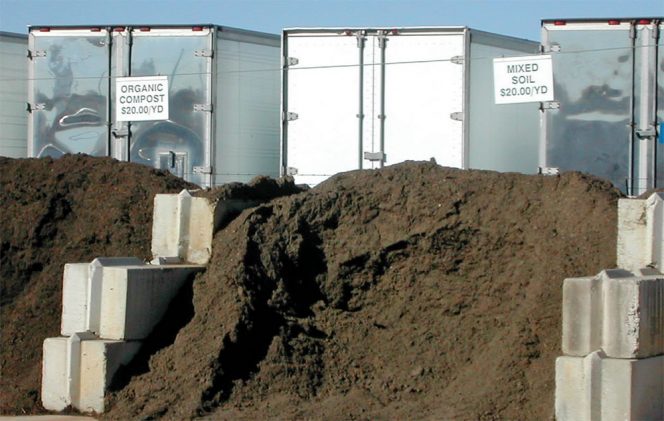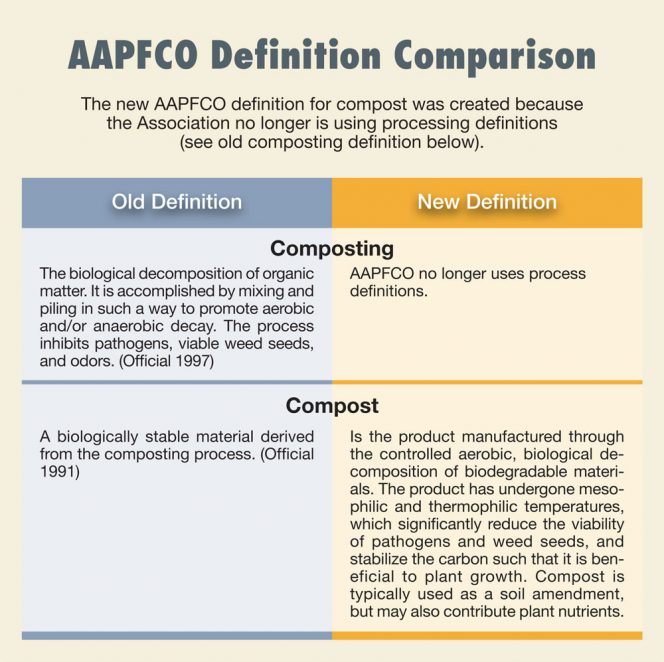New definition for compost, and model language to exempt compost, biosolids and manure products, where warranted, under the Urban Landscape Fertilizer regulations, are among latest AAPFCO developments.
Ron Alexander
BioCycle September 2017

What can be said legally about “compost” on a product label and/or promotional materials is determined by “Control Officials” within individual state Departments of Agriculture.
Further, what can be said legally about “compost” on a product label and/or promotional materials is controlled on a state level in the U.S. The “Control Officials” in each state Department of Agriculture (DOA) are members of the American Association of Plant Food Control Officials (AAPFCO), who register and regulate the distribution of fertilizer, soil amendments and liming agents (and sometimes pesticides and animal feed). The U.S. composting industry (commercial-scale), being 4,500 to 5,000 facilities strong and over 35 years old, needs to stay engaged with AAPFCO and its state members, thereby appropriately impacting state soil amendment and fertilizer regulations.
AAPFCO, which also represents control officials in U.S. territories and Canada, creates model laws and regulations to assist interstate commerce with these agricultural and horticultural staples. Its primary goals pertain to consumer protection, requiring “truth in labeling” and uniform regulation from state to state. It should be noted, however, that their model laws, regulations and Statements of Uniform Interpretation and Policy (SUIP) are created to provide guidance to states. They are not forced upon them.
Over the years, a small number of composting industry representatives, strategically funded by the US Composting Council (USCC), have greatly impacted compost labeling and registration, and protected the industry from unscientific attacks from competing industries, as well as some misinformed but well intentioned individuals. It must be noted that honest concern about the safety of compost products, typically related to its feedstock sources (which may contain some pathogens and low levels of heavy metals and other chemical contaminants), as well as their efficacy, have come up from time to time. These concerns have been addressed with scientific data.
Past Successes
Some important past successes of the USCC’s involvement with AAPFCO include:
Introduced TMECC Manual. The USCC introduced the Test Methods for the Examination of Composting and Compost (TMECC) test manual, which AAPFCO accepted as a viable set of testing methods.
Assisted in rewrite of the Uniform Soil Amendment Bill. The rewrite better defines soil amendments, and the rules and regulations pertaining to their distribution and sale. (Most composts are marketed as soil amendments/conditioners.)
Assisted in creating definitions. Input on definitions for various carbon-based soil amending products was provided, including digestates, compost extracts (teas), vermicompost, etc. — and most recently, redefining “compost” (see below).
 Created “Rules and Regulations for Bulk Compost.” Not yet adopted by any state, these rules and regulations create a framework for making nutrient claims for bulk compost products stored outdoors. The most impactful aspect of the “draft” rules and regulations are a standardized list of labeling claims for compost (see Claims sidebar). The list helps state Control Officials automatically accept well-documented and acknowledged benefits of soil amendments (compost), without requiring further research by individual product manufacturers.
Created “Rules and Regulations for Bulk Compost.” Not yet adopted by any state, these rules and regulations create a framework for making nutrient claims for bulk compost products stored outdoors. The most impactful aspect of the “draft” rules and regulations are a standardized list of labeling claims for compost (see Claims sidebar). The list helps state Control Officials automatically accept well-documented and acknowledged benefits of soil amendments (compost), without requiring further research by individual product manufacturers.
Assisted in development of “Heavy Metals in Fertilizer SUIP” (SUIP #25). The USCC industry liaison got involved through AAPFCO’s Environmental Affairs Committee because of its interest in developing a set of heavy metal standards for fertilizers, which would have impacted any compost products registered as a fertilizer, as well as all manure-based composts. This initiative began because of a scare in Washington State regarding heavy metal-tainted fertilizer killing some farm animals. This initiative culminated in development of SUIP #25, containing numerical heavy metal standards for fertilizers, which were based on two independent risk assessments. Because of USCC’s involvement, the finalized SUIP lists compost as an exempted product, which does not have to meet the fertilizer heavy metal standards, but instead must meet those developed by the U.S. EPA in its 40 CFR 503 Regulations. This involvement enabled science to “rule the day.”’
More Recent Initiatives
More recent initiatives include providing ongoing input to SUIP #34, the “Fertilizer Restrictions for Urban Landscapes” (as well as related fertilizer policy language). Various states are creating fertilizer restrictions on phosphorus and nitrogen fertilizer usage as a means to protect surface and ground water. Although the USCC supports protection of water, several of the states’ initiatives unfairly affect compost, which often contains less mobile forms of nutrients, and generally “miss the mark’’ of creating regulation through the usage of good science. In general, the USCC’s input led to model language for states to exempt compost, biosolids and manure products, where warranted from related state regulation.
Another initiative was to redefine the term “compost.” There has been interest in improving the existing definition for “compost” in order to reduce confusion in the marketplace. The new and old definitions are summarized in “Compost Definitions” below. Key reasons to modify the definition include:
• The old ”composting” definition was scientifically “inaccurate” (and AAPFCO no longer wants to describe processes, just products).
• The old ”compost” definition was not descriptive enough, so could allow many noncompost products to be confused with “real” compost.
• The composting industry wanted to promote that compost: a) was produced through a “manufacturing” process; b) was different from anaerobic digestion products; c) was heat treated and thus destroys most human pathogens and weed seeds (there has been a lot of concern about human pathogens in food); and d) contains stabilized carbon (which is more beneficial to soil than unstabilized carbon).
• The last line in the new definition basically allows composters to register their product as a soil amendment or fertilizer (“fertilizer” in labeling and registration just means that the product can legally make nutrient claims), depending on their labeling claims and overall desire.
Although this (negotiated) new definition may not be perfect — which is often the case with AAPFCO’s definitions that are a cross between scientific and marketing definitions — it is much better than the old definition, and helps to differentiate compost products in the marketplace.
It is clear that for the composting industry to be considered a ”real” commercial industry, one supplying efficacious products to the retail, lawn/garden and agricultural sectors, it must be engaged in developing the regulation that impacts sale of its products. The USCC’s long-term investment in staying involved in AAPFCO benefits the composting industry as a whole. This involvement allows our industry to kick off new initiatives, as well as address concerns when things go wrong. If we are not in the room, then we will surely be locked out of it.
Ron Alexander is president of R. Alexander Associates, Inc. in Apex, North Caroline (919-367-8350, alexassoc@earthlink.net, www.alexassoc.net). R. Alexander Associates, Inc. specializes in market research and development for recycled organics products. He currently serves as an Industry Liaison to AAPFCO representing the US Composting Council.










